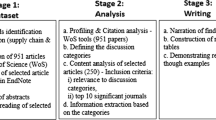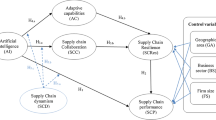Abstract
The link between green supply chain (GSC) and firm performance has been thoroughly studied, and it has been argued that firms are unlikely to perform well if they apply their capabilities in isolation. However, there is a lack of studies that identify the competitive determinants, the critical success factors, of GSC capabilities of firms, and the evaluation of GSC capabilities is predisposed to subjective and linguistic preferences. This study proposes to address the vague nature of qualitative measures using the fuzzy Delphi method to filter the measures and the fuzzy analytic network process to deal with the linguistic preferences in hierarchical structure of firms’ GSC capabilities. Data were collected from supply chain networks of electronic industry in Taiwan. This study presents empirical evidence of firms’ GSC capabilities, concluding that cost is the top competitive determinant and the environmental costs is the top priority of GSC capability.


Similar content being viewed by others
References
Agarwal A, Shankar R, Tiwari MK (2007) Modeling agility of supply chain. Ind Mark Manag 36:443–457
Aragon-Correa JA, Sharma S (2003) A contingent resource-based view of proactive corporate environmental strategy. Acad Manag J 29(1):71–88
Berman SL, Wicks AC, Kotha S, Jones TM (1999) Does stakeholder orientation matter? The relationship between stakeholder management models and firm financial performance. Acad Manag J 42(5):488–506
Cao M, Zhang Q (2010) Supply chain collaborative advantage: a firm’s perspective. Int J Prod Econ 128:358–367
Chang DS, Yeh LT, Liu W (2015) Incorporating the carbon footprint to measure industry context and energy consumption effect on environmental performance of business operations. Clean Technol Environ Policy 17(2):359–371
Cooper DR, dan Emory CW (1995) Business research methods. Irwin, Martinsville
Corbett CJ, Kirsch DA (2001) International diffusion of ISO 14000 certification. Prod Oper Manag 10(3):327–342
Dou Y, Zhu Q, Sarkis J (2014) Evaluating green supplier development programs with a grey-analytical network process-based methodology. Eur J Oper Res 223:420–431
Eisenhardt KM, Martin JA (2000) Dynamic capabilities: what are they? Strateg Manag J 21:1105–1122
Fandela G, Stammen M (2004) A general model for extended strategic supply chain management with emphasis on product life cycles including development and recycling. Int J Prod Econ 89:293–308
Frohlich MT, Westbrook R (2001) Arcs of integration: an international study of supply chain strategies. J Oper Manag 19:185–200
Gonzalez P, Sarkis J, Adenso-Diaz B (2008) Environmental management system certification and its influence on corporate practices: evidence from the automotive industry. Int J Oper Prod Manag 28(11):1021–1041
Hayes RH, Wheelwright SC (1984) Restoring our competitive edge: competing through manufacturing. Wiley, New York
Hervani AA, Helms MM, Sarkis J (2005) Performance measurement for green supply chain management. Benchmarking 12(4):330–353
Hofer C, Cantor DE, Dai J (2012) The competitive determinants of a firm’s environmental management activities: evidence from US manufacturing industries. J Oper Manag 30(1–2):69–84
Kjaerheim G (2004) Cleaner production and sustainability. J Clean Prod 13:329–339
Lee HL (2002) Aligning supply chain strategies with product uncertainties. Calif Manag Rev 44(3):105–119
Lin YH, Tseng ML (2015) Assessing the competitive priorities within sustainable supply chain management under uncertainty. J Clean Prod (Article in press)
Lin YH, Chen CC, Tsai CF, Tseng ML (2014) Balanced scorecard performance evaluation in a close-loop hierarchical model under uncertainty. Appl Soft Comput 24:1022–1032
Lu CS (2007) Evaluating key resources and capabilities for liner shipping services. Transp Rev 27(3):285–310
Lu CS, Yang CC (2006) Evaluating key logistics capabilities for international distribution center operations in Taiwan. Transp J 45(4):9–27
Michelsen O (2007) Investigation of relationships in a supply chain in order to improve environmental performance. Clean Technol Environ Policy 9(2):115–123
Monczka RM, Petersen KJ (2012) The competitive potential of supply management. Supply Chain Manag Rev, May/June, pp 10–18
Morrissey AJ, Browne J (2004) Waste management models and their application to sustainable waste management. Waste Manag 24:297–308
Noorderhaben N (1995) Strategic decision making. Addison-Wesley, Wokingham
Mathiyazhagan K, Govindan K, NoorulHaq A, Geng Y (2013) An ISM approach for the barrier analysis in implementing green supply chain management. J Clean Prod 47:283–297
Roh J, Min H, Hong P (2011) A coordination theory approach to restructuring the global supply chain. Int J Prod Res 49(15):4517–4541
Rondinelli DA, Vastag G (1996) International environmental standards and corporate policies: an integrative framework. Calif Manag Rev 39(1):106–122
Saaty TL (1980) The analytic hierarchy process. McGraw Hill, New York
Saaty TL (1996) Decision making with dependence and feedback: the analytic network process. RWS Publications, Pittsburgh
Sarkis J (1998) Evaluating environmentally conscious business practices. Eur J Oper Res 107(1):159–174
Shang KC, Lu CS, Li S (2010) A taxonomy of green supply chain management capability among electronics-related manufacturing firms in Taiwan. J Environ Manage 91:1218–1226
Soeanu A, Debbabi M, Allouche M, Belanger M, Lechevin N (2015) Hierarchy aware distributed plan execution monitoring. Expert Syst Appl 43:66–81
Srivastava SK (2007) Green supply-chain management: a state-of-the-art literature review. Int J Manag Rev 9(1):53–80
Wu T, Wu Y, Chen YJ, Goh M (2013) Aligning supply chain strategy with corporate environmental strategy: a contingency approach. Int J Prod Econ 147:220–229
Tan KC, Steven B, Lyman J, Wisner D (2002) Supply chain management: a strategic perspective. Int J Oper Prod Manag 22(5/6):614–632
Teece D (2007) Explicating dynamic capabilities: the nature and micro-foundations of (sustainable) enterprise performance. Strateg Manag J 28(13):1319–1350
Triantaphyllou E, Lin C (1996) Development and evaluation of five fuzzy multi-attribute decision-making methods. Approx Reason 14(4):281–310
TSEC, Taiwan Stock Exchange Corporation (2007) Database of listed companies in Taiwan. http://www.twse.com.tw/en
Tseng ML (2011a) Using a hybrid MCDM method to evaluate firm environmental knowledge management in uncertainty. Appl Soft Comput 11(1):1340–1352
Tseng ML (2011b) Green supply chain management with linguistic preferences and incomplete information. Appl Soft Comput 11(8):4894–4903
Tseng ML (2013) Modeling the sustainable production indicators in linguistic preferences. J Clean Prod 40:46–56
Tseng ML, Lin YH, Chiu ASF, Liao CH (2008) Using FANP approach on selection of competitive priorities based on cleaner production implementation: a case study in PCB manufacturer, Taiwan. Clean Technol Environ Policy 10(1):17–29
Tseng ML, Chiang JH, Lan LW (2009a) Selection of optimal supplier in supply chain management strategy with analytic network process and choquet integral. Comput Ind Eng 57(1):330–340
Tseng ML, Divinagracia L, Divinagracia R (2009b) Evaluating firm’s sustainable production indicators in uncertainty. Comput Ind Eng 57:1393–1403
Tseng ML, Lin RJ, Lin YH, Chen RH, Tan K (2014) Close-loop or open hierarchical structures in green supply chain management under uncertainty. Expert Syst Appl 41(7):3250–3260
Tseng ML, Lim KM, Wong WP (2015) Sustainable supply chain management: a closed-loop network approach. Ind Manag Data Syst 115(3):436–461
Tsireme AI, Nikolaou EI, Georgantzis N, Tsagarakis KP (2012) The influence of environmental policy on the decisions of managers to adopt G-SCM practices. Clean Technol Environ Policy 14(5):953–964
van Hoof B, Thiell M (2015) Anchor company contribution to cleaner production dissemination: experience from a Mexican sustainable supply programme. J Clean Prod 86:245–255
Vickery SK, Jayaram J, Droge C, Calantone R (2003) The effects of an integrative supply chain strategy on customer service and financial performance: an analysis of direct versus indirect relationships. J Oper Manag 21(5):523–539
Wu KJ, Liao CJ, Tseng ML, Chiu ASF (2015) Exploring decisive factors in green supply chain practices under uncertainty. Int J Prod Econ 159:147–157
Yusuf YY, Gunasekaran A, Adeleye EO, Sivayoganathan K (2004) Agile supply chain capabilities: determinants of competitive objectives. Eur J Oper Res 159:379–392
Zhang Q, Vonderembse MA, Lim J (2003) Manufacturing flexibility: defining and analyzing relationships among competence, capability, and customer satisfaction. J Oper Manag 21(2):173–191
Zhu Q, Dou Y, Sarkis J (2010) A portfolio-based analysis for green supplier management using the analytical network process. Suppl Chain Manag 15(4):306–319
Zhu Q, Sarkis J (2006) An inter-sectoral comparison of green supply chain management in China: drivers and practices. J Clean Prod 14:472–486
Zhu Q, Sarkis J (2007) The moderating effects of institutional pressures on emergent green supply chain practices and performance. Int J Prod Res 45(18–19):4333–4355
Zhu Q, Sarkis J, Geng Y (2005) Green supply chain management in China: pressures, practices and performance. Int J Oper Prod Manag 25(5):449–468
Zhu Q, Sarkis J, Lai K (2013) Institutional-based antecedents and performance outcomes of internal and external green supply chain management practices. J Purch Supply Manag 19(2):106–117
Zhu Q, Sarkis J, Cordeiro JJ, Lai K (2008) Firm-level correlates of emergent green supply chain management practices in the Chinese context. OMEGA-Int J Manag Sci 36(4):577–591
Author information
Authors and Affiliations
Corresponding author
Rights and permissions
About this article
Cite this article
Tseng, ML., Tan, K. & Chiu, A.S.F. Identifying the competitive determinants of firms’ green supply chain capabilities under uncertainty. Clean Techn Environ Policy 18, 1247–1262 (2016). https://doi.org/10.1007/s10098-015-1064-0
Received:
Accepted:
Published:
Issue Date:
DOI: https://doi.org/10.1007/s10098-015-1064-0




